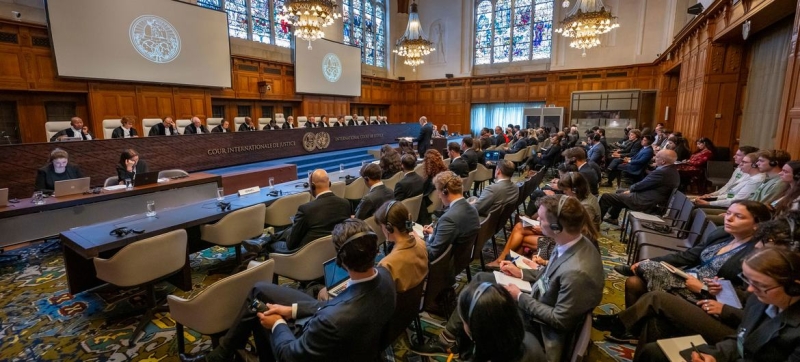
Hall of the International Court of Justice in The Hague Gaza: International Court of Justice orders Israel to cease military operations in Rafah International Law
The International Court of Justice on Friday announced new provisional measures in South Africa’s claim, ordering Israel to immediately cease military operations in Rafah in the southern Gaza Strip and open the border crossing for the urgent delivery of humanitarian aid.
Recall that South Africa accused Israel of violating its obligations under the Genocide Convention. Reading out the decision on the new provisional measures at a public hearing in The Hague, International Court of Justice Judge Nawaf Salam said Israel must comply with its obligations under the Genocide Convention and “immediately cease its military offensive and any other actions in Rafah province that could expose Palestinians to Gaza living conditions that will lead to their physical destruction in whole or in part.” The court made this decision by 13 votes in favor and two against.
Re-request of South Africa
The new temporary measures were taken in response to South Africa’s renewed request on 10 May. Back in December, South Africa filed a claim with the Court, accusing Israel of violating its obligations under the Genocide Convention during the war in Gaza.
War Gaza, we recall, flared up after Hamas attacks on Israel in October, which killed more than 1,200 people and took another 250 hostage. Israel’s military response to date has killed nearly 36,000 Palestinians and led to widespread destruction and the threat of famine in Gaza.
Open the Rafah border crossing
Given the deteriorating situation following Israel’s invasion of Rafah on May 7, the court ruled, also by 13 votes in favor and two against, that, as part of the new temporary measures, Israel must keep the Rafah crossing open for the unhindered delivery of emergency humanitarian aid, and ensure unimpeded access for fact-finding missions to investigate allegations of genocide. The Rafah border crossing, which was the main entry point for humanitarian aid into the enclave, has been closed since May 7.
In addition, the International Court of Justice ordered Israel to submit a report on the steps within one month measures taken to implement these temporary measures.
Deterioration of conditions
The International Court noted that the situation in Gaza had worsened since since that body decided on temporary measures in March. For example, following the Israeli invasion of Rafah, the Najar Hospital is no longer operational and this has impacted relief efforts.
The court also noted that Israeli evacuation orders for residents of Rafih led to more than 800,000 people fleeing to places such as the coastal region of Al-Mawasi, where there were insufficient supplies and services to accommodate them.
The International Court of Justice ruled on provisional measures in January and March, ordering Israel, among other things, to take steps to ensure that sufficient humanitarian aid reaches Gaza. However, according to UN agencies, Gaza is currently not receiving the amount of aid it needs.
What is the difference between the International Court of Justice and the International Criminal Court?
Readers often confuse the International Criminal Court (ICC) and the International Court of Justice. Both courts hear claims against Israel related to the ongoing conflict in Gaza.
The cases brought to the International Court of Justice involve countries, and the ICC is a criminal court that brings cases against individual persons for war crimes or crimes against humanity. The International Court of Justice is an organ of the United Nations, and the ICC is legally independent from the UN, but has received the support of the General Assembly. genocide.
On Monday, the International Criminal Court, in connection with possible war crimes, requested arrest warrants for three Hamas leaders, Israeli Prime Minister Benjamin Netanyahu and that country’s Defense Minister Yoav Gallant. The application for warrants is currently pending.
